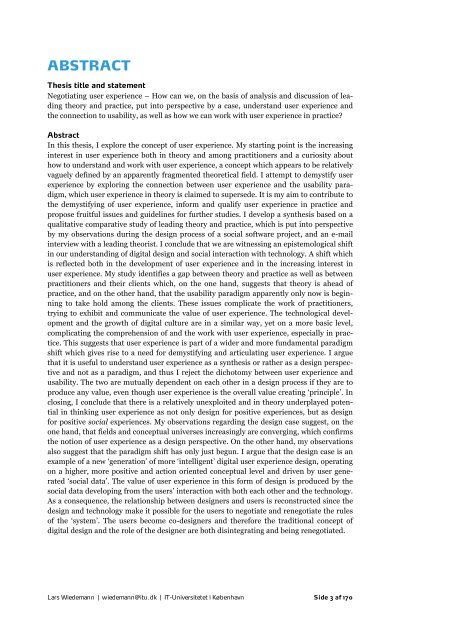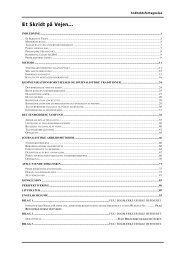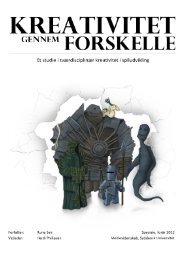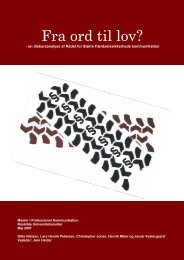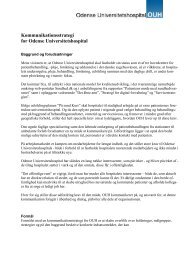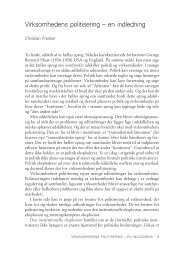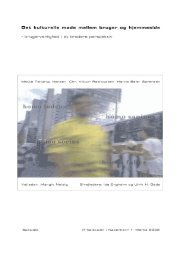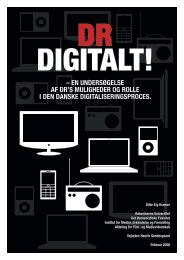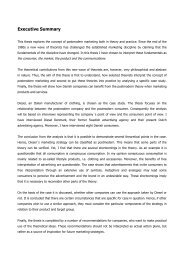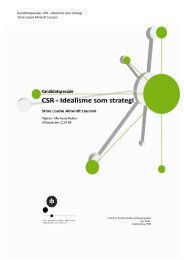User experience til forhandling - Dansk Kommunikationsforening
User experience til forhandling - Dansk Kommunikationsforening
User experience til forhandling - Dansk Kommunikationsforening
Create successful ePaper yourself
Turn your PDF publications into a flip-book with our unique Google optimized e-Paper software.
ABSTRACT<br />
Thesis title and statement<br />
Negotiating user <strong>experience</strong> – How can we, on the basis of analysis and discussion of leading<br />
theory and practice, put into perspective by a case, understand user <strong>experience</strong> and<br />
the connection to usability, as well as how we can work with user <strong>experience</strong> in practice?<br />
Abstract<br />
In this thesis, I explore the concept of user <strong>experience</strong>. My starting point is the increasing<br />
interest in user <strong>experience</strong> both in theory and among practitioners and a curiosity about<br />
how to understand and work with user <strong>experience</strong>, a concept which appears to be relatively<br />
vaguely defined by an apparently fragmented theoretical field. I attempt to demystify user<br />
<strong>experience</strong> by exploring the connection between user <strong>experience</strong> and the usability paradigm,<br />
which user <strong>experience</strong> in theory is claimed to supersede. It is my aim to contribute to<br />
the demystifying of user <strong>experience</strong>, inform and qualify user <strong>experience</strong> in practice and<br />
propose fruitful issues and guidelines for further studies. I develop a synthesis based on a<br />
qualitative comparative study of leading theory and practice, which is put into perspective<br />
by my observations during the design process of a social software project, and an e-mail<br />
interview with a leading theorist. I conclude that we are witnessing an epistemological shift<br />
in our understanding of digital design and social interaction with technology. A shift which<br />
is reflected both in the development of user <strong>experience</strong> and in the increasing interest in<br />
user <strong>experience</strong>. My study identifies a gap between theory and practice as well as between<br />
practitioners and their clients which, on the one hand, suggests that theory is ahead of<br />
practice, and on the other hand, that the usability paradigm apparently only now is beginning<br />
to take hold among the clients. These issues complicate the work of practitioners,<br />
trying to exhibit and communicate the value of user <strong>experience</strong>. The technological development<br />
and the growth of digital culture are in a similar way, yet on a more basic level,<br />
complicating the comprehension of and the work with user <strong>experience</strong>, especially in practice.<br />
This suggests that user <strong>experience</strong> is part of a wider and more fundamental paradigm<br />
shift which gives rise to a need for demystifying and articulating user <strong>experience</strong>. I argue<br />
that it is useful to understand user <strong>experience</strong> as a synthesis or rather as a design perspective<br />
and not as a paradigm, and thus I reject the dichotomy between user <strong>experience</strong> and<br />
usability. The two are mutually dependent on each other in a design process if they are to<br />
produce any value, even though user <strong>experience</strong> is the overall value creating ‘principle’. In<br />
closing, I conclude that there is a relatively unexploited and in theory underplayed potential<br />
in thinking user <strong>experience</strong> as not only design for positive <strong>experience</strong>s, but as design<br />
for positive social <strong>experience</strong>s. My observations regarding the design case suggest, on the<br />
one hand, that fields and conceptual universes increasingly are converging, which confirms<br />
the notion of user <strong>experience</strong> as a design perspective. On the other hand, my observations<br />
also suggest that the paradigm shift has only just begun. I argue that the design case is an<br />
example of a new ‘generation’ of more ‘intelligent’ digital user <strong>experience</strong> design, operating<br />
on a higher, more positive and action oriented conceptual level and driven by user generated<br />
‘social data’. The value of user <strong>experience</strong> in this form of design is produced by the<br />
social data developing from the users’ interaction with both each other and the technology.<br />
As a consequence, the relationship between designers and users is reconstructed since the<br />
design and technology make it possible for the users to negotiate and renegotiate the rules<br />
of the ‘system’. The users become co-designers and therefore the traditional concept of<br />
digital design and the role of the designer are both disintegrating and being renegotiated.<br />
Lars Wiedemann | wiedemann@itu.dk | IT-Universitetet i København Side 3 af 170


